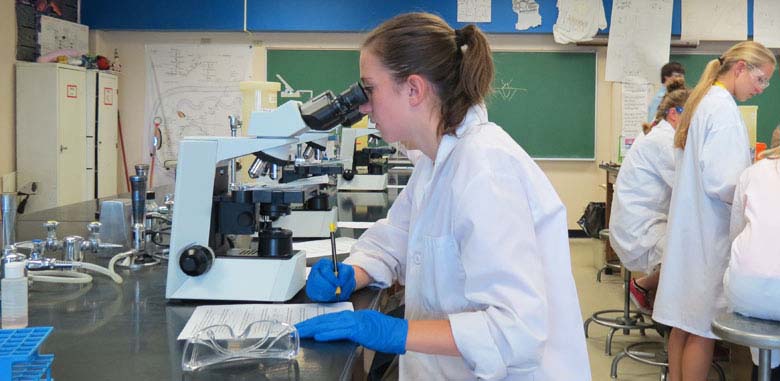What is Medical Laboratory Science What is Medical Laboratory Science?
Published March 01, 2022
By Alyssa Sudermann

If you are the type of person who enjoys looking for clues to solve mystery movies/books and also have a strong interest in biology and chemistry, you are in luck. We have the perfect degree of study for you: Medical Laboratory Science (MLS). It is also known as clinical laboratory science, and this is a bachelor’s degree focused around biology and chemistry. It involves the analysis of biological specimens, the performance of tests on patient samples, and the diagnosis of diseases.
A Detective Turned Superhero
Now, what is medical laboratory science? This health sciences profession is highly rewarding if you enjoy playing the role of a detective/superhero. Let me explain. Clinical laboratory scientists are in charge of the behind-the-scenes research on the detection of diseases in patients. They are sleuthing to figure out the clues that will reveal the “suspect” (aka the disease). But a clinical laboratory scientist is more than just a detective. The research that they do can make a huge difference in a patient’s life. It could be the difference between finding the presence of a disease and being able to treat it early on, or never detecting the disease and having it unknowingly deteriorate the patient. In this way, a clinical laboratory scientist first starts off as a detective, but goes on to take the role of a true superhero.
Finding Clues and Saving Lives
On a daily basis, medical laboratory scientists play the role of a professional detective and superhero. More specifically, they might be utilizing medical technology in order to do any of the following:
- Conducting research on body fluids, blood, and cells in a lab
- Partaking in testing regarding molecular diagnostics
- Collecting samples and identifying microorganisms
- Playing a key role in the diagnosis and treatment of diseases in patients
- Reporting test results to a physician
These medical laboratory technicians are running around on their feet all day. Trust me, you will never be bored in this career.
The Academic Road To Success
In terms of the process of becoming a clinical laboratory scientist, a typical student will progress along the following academic roadmap:
- In high school, you should take advanced courses in lab-based sciences, such as biology and chemistry, to begin building up relevant experience and knowledge.
- At university, you should pursue a Medical Laboratory Science Program.
- Then, you can go through the American Society for Clinical Pathology (ASCP) to obtain the official title of Medical Laboratory Scientist (MLS). Even though you don’t necessarily need to have the official MLS title, employers like to see that you are a certified professional.
Not All Superheros Wear Capes
Deciding to earn a degree in clinical laboratory science is making a brilliant investment in your future career. Of course, you will have to pay for your education, but the benefits to be reaped are endless. When you choose to enroll in a clinical laboratory degree program, you can play the role of a behind-the-scenes superhero. However, instead of wearing a superhero cape, you will most likely be wearing a white lab coat. Here are just a few of the many options available:
<H3>Data Scientist
As a data scientist, your main goal is to extract crucial information from data. You need to be able to go through a set of data and make it useful/understandable for others. The compensation in salary is quite rewarding, with an average base of $116,017.
<H3>Research Scientist
For all of you eager learners who are looking to make new discoveries, being a research scientist is a great option. You will be responsible for the analysis of information in a controlled laboratory setting. These scientists can start off with a base pay of $96,251!
Laboratory Supervisor
A laboratory supervisor plays the role of a manager within a laboratory. You will be supervising the staff, ensuring the proper usage of equipment, and overseeing all of the research and diagnosis conducted by technicians. This management role can start you off with a salary of $70,471.
Laboratory Technician
Laboratory technicians will typically work under the supervision of a physician or a laboratory manager. They are conducting research to detect illnesses/diseases, and then determining the best course of action in terms of a treatment plan. In this career path, the starting salary is around $42,326.
Anesthesia Technician
In this role, you will be assisting the anesthesia team in cleaning and maintaining the anesthesia equipment used by doctors in surgical procedures. This sophisticated career is absolutely vital in the health care world, because without these technicians ensuring the proper upkeep of anesthesia equipment, surgeries would go south very quickly. The salary compensation is around $42,072.
A Dynamic Workplace
Being a clinical laboratory scientist certainly won’t keep you locked in a cubicle in a tall, lonesome skyrise building all day. In fact, it’s quite the opposite, as you could be working in any of the following areas:
- Hospital
- Clinic
- Public health laboratory
- Forensic laboratory
- Biotechnology company
- Veterinary clinic
- Pharmacy
A Fruitful Future
What is clinical laboratory sciences’ future job outlook? According to the Bureau of Labor Statistics, between 2019-2029, this area of the workforce is expected to grow at 7%, which is much faster than the average. In this growing field, the employment options are looking fruitful.
<H2>A Degree and A Career You’ll Love
You might be wondering: what is medical laboratory sciences’ key advantage? Well, if you are a detail-oriented, avid learner who is passionate about studying medicine, disease, and microbiology, the perfect career as a clinical laboratory scientist is eagerly waiting for you. After the completion of a clinical laboratory science major, the career opportunities are far and wide. You will have the opportunity to be both the detective and the superhero in your community, what could be better?!
